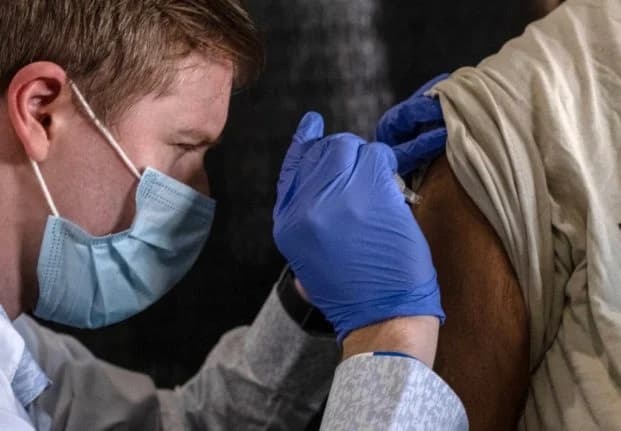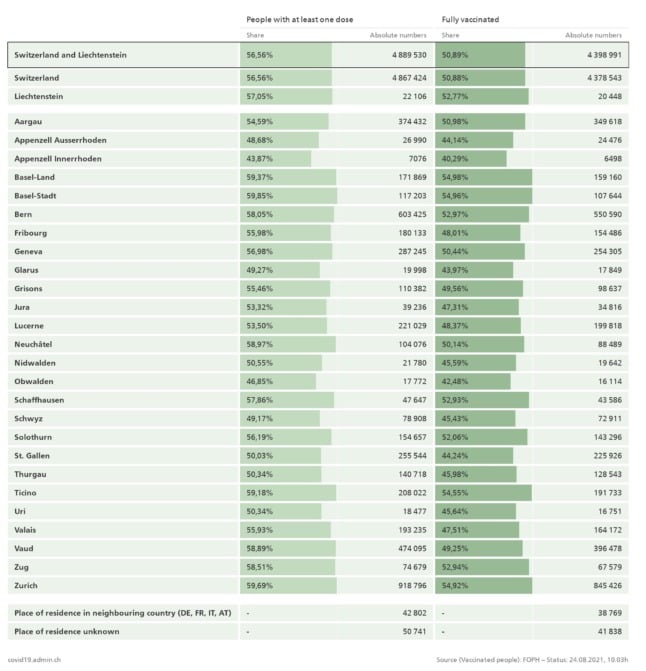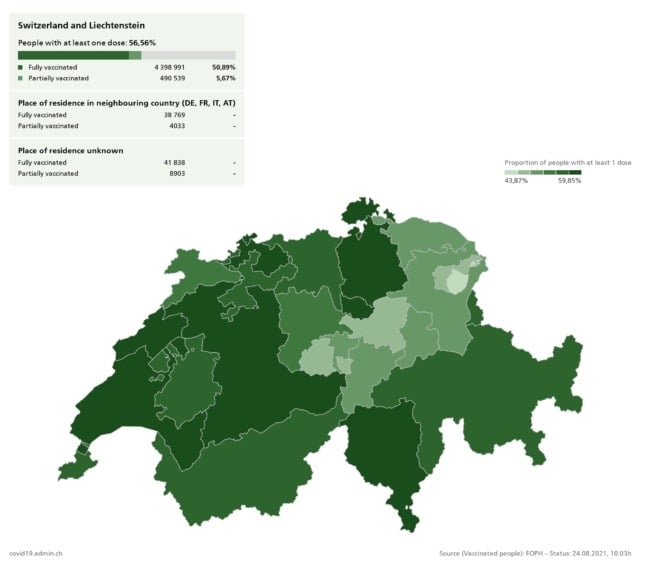Which Swiss cantons have the highest and lowest vaccination rate — and why?

Switzerland has been lagging behind its neighbours in terms of the percentage of residents fully vaccinated against Covid. What is the situation in individual cantons?
To date, just over half of Switzerland’s population (50.88 percent as of August 24th) have been fully vaccinated against coronavirus — that is, have received two shots of either Pfizer or Moderna vaccines.
Some cantons exceed the national average — mostly urban, industrialised regions, and those bordering other countries.
As the chart below compiled by the Federal Office of Public Health (FOPH) shows, Basel-Country and Basel-City have the highest immunisation rates, 54.98 and 54.96, respectively.
Next is Zurich (54.92), followed by Ticino (54.55), Bern (52.97), Zug (52.94) and Schaffhausen (52.93).
Most cantons, however, fall below the national average, with lowest rates in Appenzell Innerrhoden (40.29), Obwalden (42.48), Glarus (43.97) and Appenzell Ausserrhoden (44.14).

Why is there a difference in inoculations from canton to canton?
Although it is difficult to accurately determine why some cantons have had a higher vaccine rate than others, there are several factors which have contributed.
Initially, larger cantons lagged behind their smaller counterparts in vaccination rates due to the their size and the need to build complicated infrastructure to ensure the vaccines reached the population.
READ MORE: Why is Zurich’s vaccination rollout the slowest in Switzerland?
However, as can be seen above, the country's most populous cantons like Zurich, Bern, Aargau and Vaud are above or approaching the national average.
One further aspect which is clear is that there is an urban-rural divide in Switzerland when it comes to vaccination rates.
Study author Michael Hermann noted this urban-rural divide.
"Basically, cities are more willing to vaccinate. Rural cantons without urban centres are therefore noticeable because of their greater skepticism towards the corona vaccination."
One of the reasons for this is “that there are more people hostile to the vaccine in rural areas. Perhaps simply in part because residents in the countryside have been less affected by the pandemic”, according to analysis conducted in June by Sotomo Institute, and reported in the Swiss media.
Sotomo research also revealed that, not coincidentally, there is a particularly large number of vaccine skeptics in Obwalden and Appenzell Innerrhoden — the very cantons with the lowest immunisation rates.
The divide in mentality between city and countryside dwellers also extends to the vaccination against measles, Sotomo found, meaning that resistance to Covid vaccines should not be a surprise.
Conversely, areas which have been hit particularly hard by the pandemic such as Ticino have among the lowest vaccine sceptic rate in Switzerland.
Obwalden and Appenzell Innerrhoden escaped relatively lightly, although infections are currently on the rise.
Another possible explanation, as noted by Swiss news outlet Watson, is simply that getting the vaccine is easier and far more convenient in urban cantons, where vaccination centres may be on the same block or literally next door to people's homes or workplaces.
In Basel City and Geneva, for instance, which are perhaps Switzerland's most urban cantons, vaccination rates are among the nation's highest.
This FOPH map shows where the vaccination rates are highest and lowest.

The relatively low vaccination rate is responsible for the recent spike in the number of infections and hospital admissions, health officials say.
Urs Karrer, from Switzerland’s Covid Taskforce, pointed out that around 90 percent of those in hospital have not yet had the vaccine, with the expert calling it a “fourth wave” and a “pandemic of the unvaccinated”.
READ MORE: ‘An epidemic of the unvaccinated’: Switzerland alters vaccine rules amid pandemic’s ‘fourth wave’
Another group that features prominently among those hospitalised with Covid are foreign nationals living in Switzerland.
Health professionals and cantonal public health offices indicate that significant number of the coronavirus patients currently treated in Swiss hospitals are foreigners who have returned from holidays, particularly in the Balkans.
“We have a high proportion of patients with a migration background. Some did not want to be vaccinated. Others did not know that they should have been vaccinated”, said Hans Pargger, head of the intensive care unit at the University Hospital Basel.
The Thurgau health director Urs Martin also noted that most Covid sufferers in his canton’s hospitals are “related to Balkan countries. It was not possible to “communicate successfully with these people regarding vaccination”.
READ MORE: Why are most Covid patients in Switzerland foreign nationals?
Comments
See Also
To date, just over half of Switzerland’s population (50.88 percent as of August 24th) have been fully vaccinated against coronavirus — that is, have received two shots of either Pfizer or Moderna vaccines.
Some cantons exceed the national average — mostly urban, industrialised regions, and those bordering other countries.
As the chart below compiled by the Federal Office of Public Health (FOPH) shows, Basel-Country and Basel-City have the highest immunisation rates, 54.98 and 54.96, respectively.
Next is Zurich (54.92), followed by Ticino (54.55), Bern (52.97), Zug (52.94) and Schaffhausen (52.93).
Most cantons, however, fall below the national average, with lowest rates in Appenzell Innerrhoden (40.29), Obwalden (42.48), Glarus (43.97) and Appenzell Ausserrhoden (44.14).

Why is there a difference in inoculations from canton to canton?
Although it is difficult to accurately determine why some cantons have had a higher vaccine rate than others, there are several factors which have contributed.
Initially, larger cantons lagged behind their smaller counterparts in vaccination rates due to the their size and the need to build complicated infrastructure to ensure the vaccines reached the population.
READ MORE: Why is Zurich’s vaccination rollout the slowest in Switzerland?
However, as can be seen above, the country's most populous cantons like Zurich, Bern, Aargau and Vaud are above or approaching the national average.
One further aspect which is clear is that there is an urban-rural divide in Switzerland when it comes to vaccination rates.
Study author Michael Hermann noted this urban-rural divide.
"Basically, cities are more willing to vaccinate. Rural cantons without urban centres are therefore noticeable because of their greater skepticism towards the corona vaccination."
One of the reasons for this is “that there are more people hostile to the vaccine in rural areas. Perhaps simply in part because residents in the countryside have been less affected by the pandemic”, according to analysis conducted in June by Sotomo Institute, and reported in the Swiss media.
Sotomo research also revealed that, not coincidentally, there is a particularly large number of vaccine skeptics in Obwalden and Appenzell Innerrhoden — the very cantons with the lowest immunisation rates.
The divide in mentality between city and countryside dwellers also extends to the vaccination against measles, Sotomo found, meaning that resistance to Covid vaccines should not be a surprise.
Conversely, areas which have been hit particularly hard by the pandemic such as Ticino have among the lowest vaccine sceptic rate in Switzerland.
Obwalden and Appenzell Innerrhoden escaped relatively lightly, although infections are currently on the rise.
Another possible explanation, as noted by Swiss news outlet Watson, is simply that getting the vaccine is easier and far more convenient in urban cantons, where vaccination centres may be on the same block or literally next door to people's homes or workplaces.
In Basel City and Geneva, for instance, which are perhaps Switzerland's most urban cantons, vaccination rates are among the nation's highest.
This FOPH map shows where the vaccination rates are highest and lowest.

The relatively low vaccination rate is responsible for the recent spike in the number of infections and hospital admissions, health officials say.
Urs Karrer, from Switzerland’s Covid Taskforce, pointed out that around 90 percent of those in hospital have not yet had the vaccine, with the expert calling it a “fourth wave” and a “pandemic of the unvaccinated”.
READ MORE: ‘An epidemic of the unvaccinated’: Switzerland alters vaccine rules amid pandemic’s ‘fourth wave’
Another group that features prominently among those hospitalised with Covid are foreign nationals living in Switzerland.
Health professionals and cantonal public health offices indicate that significant number of the coronavirus patients currently treated in Swiss hospitals are foreigners who have returned from holidays, particularly in the Balkans.
“We have a high proportion of patients with a migration background. Some did not want to be vaccinated. Others did not know that they should have been vaccinated”, said Hans Pargger, head of the intensive care unit at the University Hospital Basel.
The Thurgau health director Urs Martin also noted that most Covid sufferers in his canton’s hospitals are “related to Balkan countries. It was not possible to “communicate successfully with these people regarding vaccination”.
READ MORE: Why are most Covid patients in Switzerland foreign nationals?
Join the conversation in our comments section below. Share your own views and experience and if you have a question or suggestion for our journalists then email us at [email protected].
Please keep comments civil, constructive and on topic – and make sure to read our terms of use before getting involved.
Please log in here to leave a comment.